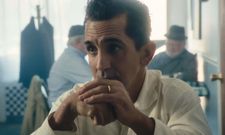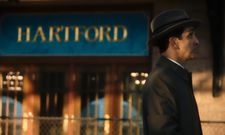 |
| James Madio and Ruby Wolf in The Featherweight Photo: courtesy of Pep Films LLC |
Director Robert Kolodny's The Featherweight, written by Steve Loff, chronicles a brief period in the life of Italian-American boxer Willie Pep, played by James Madio. Set in mid-1960s Connecticut, Pep, the winningest fighter in boxing history, finds his personal life in tatters. Married to aspiring actress Linda Papaleo (Ruby Wolf), who is half his age, with a drug-addled son and financial pressures, Pep decides, now in his mid-forties, to come out of retirement and make a surprise return to the ring. Utilising an "observational nonfiction" approach, Kolodny and Loff set up the premise of a documentary crew following Pep around, giving an intimate view of his world as he prepares for his comeback.
 |
| James Madio in The Featherweight Photo: courtesy of Pep Films LLC |
The Featherweight is a film of firsts - the feature film début for director Kolodny and Wolf, who has appeared onstage in New York and throughout the North East. Among his credits as an editor and director, Kolodny shot Alex Ross Perry's American Indie Band documentary Pavements (2024), and he has shot additional cinematography for Sean William Price's The Sweet East (2024), Laura Poitras' documentary All The Beauty And The Bloodshed (2022), about activist Nan Goldin, and Josh and Benny Safdie's sports documentary, Lenny Cooke (2013).
In conversation with Eye For Film, Kolodny and Wolf discussed penetrating the façade of masculine strength, exploring 1960s Connecticut through its cast of flawed characters, and their optimism for cinema's future.
Paul Risker: What compelled you to believe in this film and decide to tell this story at this point in time?
Robert Kolodny: I had been working on a boxing documentary for a number of years in Bulgaria. I became enamoured with the characters of the boxers, the managers, the trainers, and the vibrant world so rich with tactility. In the middle of that process, I received the script that Steve Loff had written about Willie Pep, and I really gravitated towards the characters.
I'm from the East Coast in the States myself and I saw a lot of people I knew in it, and places that I recognised. So, I immediately attached myself and over the next few years we developed it and imbued it more with this language of documentary.
PR: The film has a striking originality. When you first read the script Ruby, what were your first impressions?
Ruby Wolf : Well, that's what I love about the film - it's this crazy amalgam. It's a boxing genre film, but it's also not. It's a biopic and also a family drama, a mock documentary and a period piece. It has all of these disparate genres coming together to create this beautiful Frankenstein monster of a film - I loved that on the page.
The character of Linda immediately resonated with me, because I felt she could understand what it was like to be an aspiring actor waiting for an opportunity to present itself for you to seize. It was smart on Rob's part to cast a person like me who was looking to transition into film after years of stage acting. By seeing this as the singular opportunity that it is, I could relate to Linda, and that was a joyful aspect of getting to play this character.
I would also say that Hartford, Connecticut, has a little bit of autobiographical significance in my life. My mother grew up just outside of Hartford in the 1960s and was herself adjacent to the Italian-American community therein. Growing up, I had heard all the stories about her family's experience of that time and place, and the script felt true to that. There was a lot of kismet and natural synergy by the time Rob so graciously shared the script with me, and I was thrilled to work on it.
PR: 'Immigration' and 'immigrant' are toxic words in our contemporary world, and yet migration has developed our collective cultures, our languages and ideas. Art has the strength to counter the political and economic dehumanisation we regularly witness, and while the characters in this film are flawed, they are deeply human.
 |
| The Featherweight Photo: courtesy of Pep Films LLC |
RK: It's important to tell stories about characters that exist in a grey area. None of the characters in this film are heroes, nor are any of them villains. They are realistic, three-dimensional people. Everyone in their lives deals with hardships and the perception of how they want to be seen, and the realities of the circumstances of their lives. So, dramaturgically, as a storyteller, this is the kind of story that needs to be told. These are the kinds of characters that speak to our humanity and are a reflection of not only the society that we live in, but what society was in the 1960s in Connecticut, where this film takes place.
RW: What's interesting about the Italian-American community in Hartford, Connecticut, as it's reflected through our film, is Willie Pep wasn't the world's most famous flower salesman; he was the world's most famous boxer.
Boxing is this pugilistic sport: the ultimate act of conflict, of person-to-person violence personified in the ring. What you were saying about this anti-immigrant sentiment that permeates our present cultural moment, was also very present in the time period just preceding when the film takes place.
That toughness and the need to be tough and strong, that perception of toxic masculine energy of assuming the position of strength and violence to prove dominance, comes from being rejected culturally, and needing to adopt those things to be self-protective. And so, to me, the backdrop of the fighter is always a person who, on some level, feels like they need to fight because there's something that they're fighting actively against. Bringing the immigration perspective into it is an interesting lens to view the film. It's omnipresent without ever being implicit in what we created.
PR: There's an effortlessness in the way the themes and ideas are presented. It never feels like you're talking to the audience, instead you're inviting them into a conversation. This subtlety is ironic considering the violent nature of boxing.
RW: I'm not a person who would tout myself as a boxing fan or even a fan of the boxing genre because, and Rob knows this, I'm an intensely squeamish person [laughs]. Blood is not for me. So, when Rob told me he had this script that he thought would be great for me, I said, "Cool, what's it about?" When he said it was a boxing movie, I remember thinking, 'Does he know me? Has he met me?' Then I read the script, and to me, it felt like a contemplation of the pitfalls of toxic masculinity, and the frail façade of masculine violent strength.
What's behind that is so much softer and sadder, and I like that this movie gives space to those softer and sadder moments. It's not just cut after cut, after cut, after shot after shot, after shot, of two people pounding each other in a ring. And that is a lovely departure for the boxing genre; not that I think the boxing genre needs to cater to my particular tastes [laughs], with me being this squeamish person. The magic of this piece is that it defies that expectation in a lovely and exciting way.
RK: Part of the way that we're creating this illusion is in the language of cinema that we use. By allowing it to feel like we're watching a documentary, hopefully, if we're doing our job correctly, it will lull an audience into a sense that this is how a documentary flows, and therefore, I'm being presented with fact rather than fiction. When you watch any film, you want the storytelling to cast that spell and for you to buy into it.
There's a trick we're playing here with the language of non-fiction and the barrier to entry of presuming its truth. Through that, and the ephemeral nature of how documentaries are viewed, it allows us an entry point that gets us intimately close to the characters, and the actors are doing their job of portraying emotions in a real human way. It's accessible in maybe a modality that's more potent than you would have without this construct.
 |
| James Madio in The Featherweight Photo: courtesy of Pep Films LLC |
PR: Isabelle Huppert, head juror at the 2024 Venice Film Festival, has expressed concerns about the future of cinema, owing to its current "very weak” condition. We must remember that cinema is still in its infancy, and we're trying to understand what cinema can be. Do you share these concerns about cinema's future?
RK: Maybe the industry of cinema is going through cataclysmic changes, but the reality is that the tools to make a film have never been more democratised than they are now. It means more voices, marginalised and independent ones have more of an opportunity to make something. There are also more distribution options to get those films out there to a wider audience. It will be a different way to what has been traditional, but that's a good thing.
Cinema is in its infancy and if you look at the history of painting and literature, the way we read, or view things has changed and shifted. And the spaces in which those take place change and evolve. In order for an art form to not become a dead, it must evolve. So, I am optimistic about the future of cinema, and I'm reminded often of a quote by François Truffaut: "The film of tomorrow will be an act of love." This is the most human perspective on making a film, and it's a perspective which any actor, director, writer, producer should go into making their film.
RW: In the 15 years that I've been pursuing acting as a career, my mother has always said what she hopes for me is that I will find an artistic family that I get to grow and build and play with. I felt that so much on this set every single day. What Rob and his producing partner Bennett Elliott have created is that artistic family. People coming together in a strong collaboration, predicated on mutual love and trust, and with that familial tie and bond is what I hope for cinema. It has been the honour of my life to be a part of it.
The Featherweight is released theatrically in New York and Connecticut on September 20th, and in Los Angeles on September 27th.





















